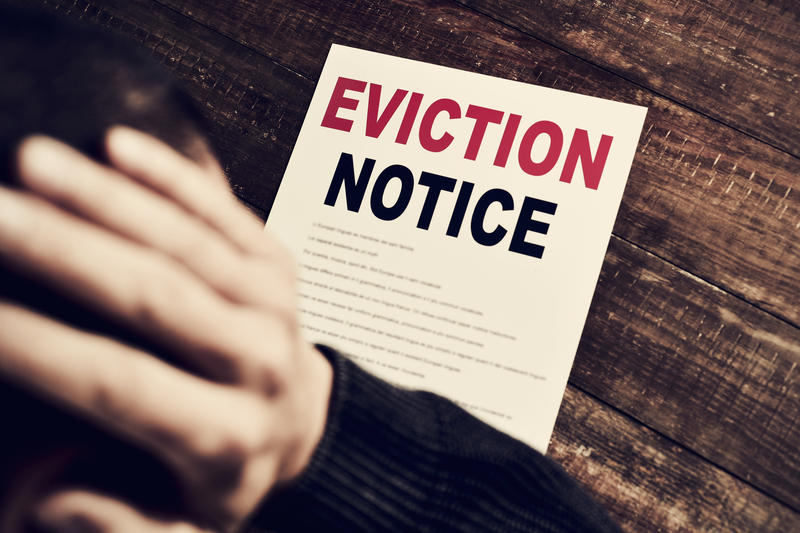Rental Evictions Rising
Rental Evictions Rising; Affordable Housing Not Meeting Demand
Charlotte voters will be asked in November to more than triple the city’s Housing Trust Fund, to $50 million. It’s part of a plan to increase affordable housing. City officials say there’s a 34,000-unit shortfall.
And eviction notices are going up again, after several years of decline following the recession of a decade ago. In the fiscal year that ended June 30, landlords filed more than 30,000 eviction notices in Mecklenburg County, according to the North Carolina Administrative Office of the Courts. That’s an increase of about 1,000 from the previous year.
Find North Carolina Eviction Help for Landlords and Tenants on NationalEvictions.com
In 2010, rental housing in Charlotte averaged about $800 a month, according to the U.S. Census. Today, the average is around $1,100, a nearly 40 percent increase. Ashley Clark of UNC Charlotte’s Urban Institute says there are consequences.
“Renting costs have increased and wages haven’t kept pace, and that creates challenges for people looking for housing,” Clark said.
And challenges in holding on to housing. Clark co-authored a report on evictions in Mecklenburg County, released in March. Although the median household income in the county increased by 14 percent since 2010, when adjusted for inflation, the report says the increase is only about 2 percent.
The Urban Institute’s analysis of 2016 court records found about 25 evictions take place every day in the county, mostly for nonpayment. The average amount owed was $850.
“We found that areas with higher percentages of low-income families, African-American families, had higher rates of evictions in those communities,” Clark said.
Those communities are in the northeast, east, west and southwest parts of the county.
Rents are lower in many of those communities, but the median household income for residents there is between $26,000 and $42,000, according to the Urban Institute report. It’s nearly $63,000 for the county.
“They’re one crisis, one paycheck away from eviction,” said Courtney Morton, a Mecklenburg housing and homeless research coordinator. “Which underscores for us the need for more affordable housing.”
A few months ago, Jean Compas did not meet the tenth of the month deadline to pay his rent, the day before landlords typically file eviction notices.
“On the eleventh day I offered to pay that month and they wouldn’t take it unless I paid for the following month, including court fees, which brought me to this problem here,” Compas said.
Compas and his landlord’s attorney came to an agreement. Compas won’t be evicted if he pays all of the back rent, more than $2200, by the end of the month.
“My kids, I’m raising and I don’t want to have, there’s a lot of stuff to move. I’ll make it but it’s a struggle,” Compas said.
Nearly 45 percent of residents in the city and county are renters—about the same as Seattle, Indianapolis and Raleigh. Charlotte’s population has increased by 17 percent since 2010. To accommodate that growth, developers are building or plan to build 27,000 apartments, according to RealData. Twenty thousand have been built in the past five years, with rents on the new units averaging $1,400. At the same time, lots of older, more affordable rental complexes and homes are being razed to make way for new construction as neighborhoods become gentrified.
Ashley Clark says more low- and middle-income people are left with the choices of moving farther away from their jobs in the city or into less safe neighborhoods. But some are opting for the more expensive units that they can barely afford.
“We know that between 2010 and 2014, 46 percent of renters here were spending more than 30 percent of their gross income on housing, so by HUD’s definition that would be cost burdened and points to that there is a mismatch between affordable housing stock and what people are earning,” Clark said.
From the landlord’s point of view, Tim Szymanski, executive director of the Greater Charlotte Apartment Association, says many are willing to work with tenants before seeking evictions.
“Evictions are last resort,” Szymanski said. “Housing providers hate to do it but eventually you need to control your asset that you borrowed money on with the humanitarian side. Some are more humanitarian than others. Some are quite, and some are not particularly that way.”
The Urban Institute found that 92 percent of eviction filings are made by corporations. Szymanski says 10 years ago corporations were a small part of his organization’s membership. Now 70 percent of the group’s members who own rental properties are out-of-state corporations.
“When you don’t have locally based companies with roots in the community there may not be as much a sensitivity of working with delinquent people behind on their rent,” Szymanski said. “(There) may be some more leniency with local companies that have an understanding and roots in the community. But those companies can’t do that forever, that’s detrimental to their business.”
City officials hope an increase in the Housing Trust Fund, which finances affordable housing, will result in more rentals that low- and middle-income people can afford. But no one expects the $50 million city officials are asking for to solve the problem.
Tags: Eviction Information, North Carolina Eviction Articles












